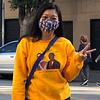Take a photo of a barcode or cover
40 reviews for:
What We Remember Will Be Saved: A Story of Refugees and the Things They Carry
Stephanie Saldaña
40 reviews for:
What We Remember Will Be Saved: A Story of Refugees and the Things They Carry
Stephanie Saldaña
challenging
dark
emotional
informative
reflective
sad
medium-paced
emotional
informative
reflective
sad
tense
medium-paced
A beautiful look at the people who are refugees from Iraq and Syria. The author focuses on four stories and tells them in a way that shows a tiny piece of the horror that has caused these people to flee from beloved homes to be safe.
challenging
dark
emotional
hopeful
informative
reflective
sad
tense
medium-paced
emotional
hopeful
informative
inspiring
reflective
sad
medium-paced
This book is an act of remembering- an absolute beautiful collection of 6 refugees stories, told via stories and interviews from Saldana. Stephanie Saldana is an absolutely fantastic storyteller. She does these 6 people stories such good justice- she really paints a picture and makes you feel for them. This book focuses on what refugees have left behind- jobs, businesses, family, safety, belonging- and how their lives and identities have changed since fleeing their home. She tells the stories of their uprooted lives and their resilience while also discussing the disappearances of language, culture, and community that refugees face. So so beautiful and so heartbreaking. These people have a bravery that I do not. I loved this book. 100% recommend.
challenging
emotional
hopeful
informative
inspiring
reflective
sad
medium-paced
emotional
hopeful
reflective
sad
medium-paced
challenging
emotional
sad
tense
medium-paced
challenging
emotional
hopeful
informative
reflective
sad
tense
medium-paced
Moderate: Genocide
challenging
informative
sad
medium-paced
In a Nutshell: A book focussing not on refugees or their distressing situations, but on what they carry with them of their earlier lives, whether material or intangible. Hard-hitting content that will not leave you easily even after the last page.
Imagine being forced to move out of your home, even your country, for things beyond your control. What would you carry, especially keeping in mind that you probably won’t be able to return? Or that with no means to travel with a heavy load, you will need to leave behind many fond items? Or that your smuggler, with that flimsy dinghy to carry you across the sea to “safety”, won’t allow you to board with more than one hand luggage?
What do you carry?
What do you leave behind?
This book tells us the six stories of men and women from Syria and Iraq, and the things they carried with them when they were compelled to vacate not just their houses but leave behind an entire life. Today, they have either received citizenship in some Western country, or they are still in a refugee camp waiting and hoping for their papers to be processed, or they are in limbo, caught in a country that refuses to legalise them but not willing to go elsewhere.
We call these people ‘refugees’. We picture them living in camps or struggling to survive in a new land speaking a new language. But do we ever remember that they had an identity before they were “refugees”? They were musicians, pharmacists, professors, farmers, engineers,… It is not just their material wealth that has vanished, but also their identity.
The author carried out her interviews with these displaced citizens over a period of six years in multiple countries. Through her question about what they carried from their homes, we get to know much more than an account of their physical possessions. We hear not just of their tangible losses but also of their memories, their language, their heritage. This book doesn’t contain a story of pain and helplessness, but one of hope and resilience, about determination and courage. It is the story of a shal, a buzuq, a pharmacy or two,… Of a musician and of a camel herder… Of an Aramaic speaker and a Yazidi raconteur… Of ordinary humans caught in extraordinary circumstances… Of the people who survived and yet died.
The anecdotes of these interviewees aren’t easy to read. The chapter based in Lesvos shattered me so much that I kept the book aside for a whole week. While each narrative was hardhitting, the one dearest to my heart was the story of the Syrian pharmacist couple, Adnan and Ghadir, possibly because theirs held the strongest promise of hope. In a book that broke me through and through, even the tiniest glimpse of hope made a difference.
There are so many takeaways from this work. We see the power of storytelling. We understand the important of familial support. We despair over the destruction of monuments and cultures by political and religious extremists. We recognise the need to have faith (not necessarily in the one above) even in the darkest of times. But my most important takeaway from this work is: Be grateful for what you have, but don’t take anything for granted. You never know when your own world could be upended either by climate change or by political or religious jerks. (using the word “jerks” in both its meanings here.) As the author herself says, "It could one day be any of us."
A must read, without a doubt. A portion of the proceeds from this book will go to organisations that support refugees.
4.5 stars. (Docking off 0.5 stars as there were no photos.)
My thanks to Broadleaf Books and Edelweiss+ for the DRC of “What We Remember Will Be Saved: A Story of Refugees and the Things They Carry”. This review is voluntary and contains my honest opinion about the book.
The author's insightful prologue, and her extensive notes on each chapter at the end of the book provide plenty of shocking facts about the displaced people of Syria and Iraq. I shall present only one of them here:
“One in every seventy-eight people globally has been forced to flee from their homes.”
One in every seventy-eight! Let that sink in.




